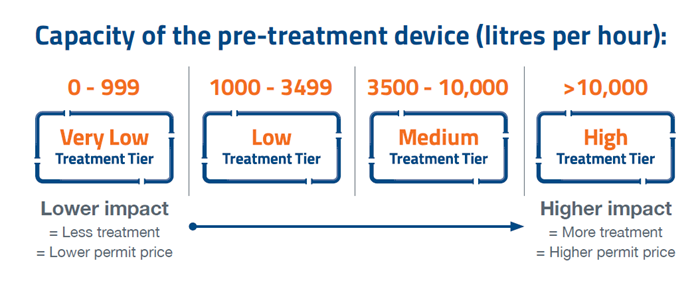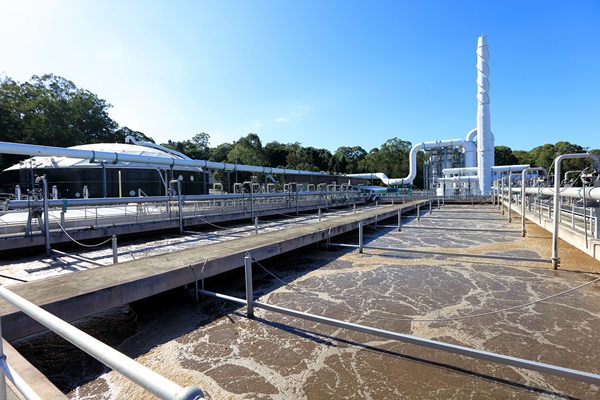Trade Waste Permit pricing change
We introduced a tiered pricing structure for all Category 1 Trade Waste Permits, effective from 1 July 2023.
The new pricing structure assigns customers into a Treatment Tier based on their type of business, the liquid waste they generate and the impact on the wastewater network. The higher the trade waste impact, the more it costs to treat and therefore the higher the Treatment Tier.
Treatment Tier FAQs
The current pricing structure enables Unitywater to continue safeguarding public health and the environment by delivering sustainable trade waste treatment services that keep our communities healthy, safe and ready for business now and into the future.
Previously, we charged businesses a single, flat-rate annual Category 1 fee of $350 (2022-23 financial year), regardless of the type or volume of their trade waste. This meant that everyone, whether they own a small coffee shop or a large 24/7 fast food restaurant, a large car wash or a small laundromat – has paid the same amount to Unitywater to safely treat trade waste.
The new pricing structure aims to create an equitable set of fees where businesses that generate trade waste contribute to the actual costs of treating it, so that these costs are not shared across our entire customer base.
Tiered pricing more accurately reflects the diverse types of businesses in our region, the varying levels of impact that their waste has on the wastewater network and the true cost of additional treatment required to keep our networks, our communities and our environment safe.
These additional costs go towards the extra chemicals, cleaning and electricity required to treat trade waste so that it does not pollute our environment, harm our people or cause blockages, overflows or damage to our network.
The previous one-size-fits-all trade waste pricing structure is outdated, does not align with current industry practice and is not consistent with pricing structures for other South East Queensland utilities.
We know there is never a right time to increase prices and we are here to support customers. We will support business owners wanting to request a review of their Treatment Tier by completing the online calculator and review form.
We have switched to billing quarterly instead of annually – allowing costs to be spread out over a year.
We are also available to speak with any customers who need information about payment plans, direct debit and other ways we can help anyone experiencing hardship. Customers are welcome to talk to us by emailing tradewaste@unitywater.com or calling 1300 086 489.
Treatment Tiers are determined based on an assessment of specific attributes of your business.
Food and beverage-related businesses
We assess each business against the following key criteria:
-
Food type: oilier, fattier, cream-based foods have a more significant impact on the wastewater network.
-
Food preparation method: deep frying, grilling or roasting food contributes higher trade waste loads at the treatment plant.
-
Kitchen facilities: large commercial-sized kitchens can produce larger volumes of higher-impact waste.
-
Customer turnover: higher seating capacity and customer turnover typically increase the amount of trade waste generated.
-
Trading hours: longer, more regular trading hours contribute higher volumes of trade waste.
-
Number of trade waste sources: a business with multiple trade waste sources, for example a kitchen plus laundry plus workshop, has a higher impact on the wastewater network.
Then we assign you a Treatment Tier ranging from Low to Very High.

If you have or are looking to purchase a food and beverage related business, please download the Trade Waste Pricing Changes - Food and Beverages Businesses Factsheet (PDF).
Non-food related businesses
Most of Unitywater’s non-food business customers have already gone through an extensive trade waste application and hydraulic assessment process to determine their trade waste output and the size of the pre-treatment device required. New trade waste customers also go through this
process.
Pre-treatment device capacity (litres per hour) is often the best indicator of trade waste impact for
this diverse range of businesses and is used to determine the Treatment Tier for non-food
businesses.
You can find information about your pre-treatment device capacity on your business premise's hydraulics plans.

If you have or are looking to purchase a non-food-related business, please download the Trade Waste Pricing Changes - Non-Food Businesses Factsheet (PDF).
Unitywater assesses your business to confirm which Treatment Tier best applies to you.
If your Treatment Tier doesn't seem quite right, you can request a review by using our online Treatment Tier Calculator.
While your business may have a pre-treatment device (such as a grease arrestor, neutralising trap, dilution tanks, oil and water separators and lint screens) in place, these devices only capture solid or partially treat and prevent trade waste from entering the sewer system.
They do not stop dissolved oils, fats, chemicals and other contaminants still passing through and posing a serious risk to the sewerage system and treatment plants. This requires further treatment, such as adding chemicals into the sewer to prevent odour and corrosion, and additional cleaning of the pipes to prevent blockages and overflows.
If you have a question about trade waste pricing, your assessment or Treatment Tier, you can:
-
Email us at tradewaste@unitywater.com
-
Call our Customer Service Team on 1300 086 489

